

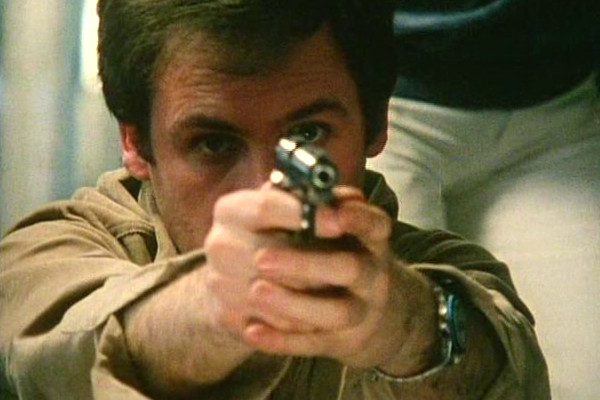
For a spy series, viewers have to buy in to the fact that The Sandbaggers is more concerned with the political manoeuvring and Machiavellian scheming behind decisions rather than any action that might take place in the field. Produced on a budget, while the show looks fine, it is studio bound and talky, though with Mackintosh's superb scripts, this is a plus, not a failing.
Decision By Committee bucks the trend by having Burnside powerless to help Willie and Karen on a hijacked plane, and having them escape certain death by engaging in a kung fu/shoot out action finale. It sits a little oddly with such a dialogue-orientated show, though Willie's mistaken faith in Burnside's ability to rescue him is a nice touch, particularly as Burnside never divulges that he was tied up in bureaucracy and had unwillingly left him to his fate.
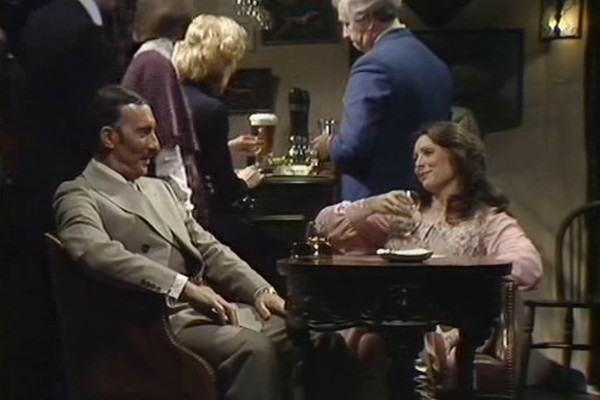
Although the final two seasons of The Sandbaggers aired in 1980, it was a programme produced during the 70s. Short ties, brown trousers and orange wallpaper are the order of the day. For a programme that's over 35 years old, then such examples of the time when it was made should be cherished, not regarded as a point of embarrassment.
While generally free of the sexism that would take place in many other programmes of the period (though Willie telling the elderly PA that "even you'd do" is unlikely to charm her), what we have here is the most dated Sandbaggers episode, with Peter Miles in brownface as an Arab sheikh. Looked on as a charming relic, it has a certain kind of appeal... the memory that there was once a time when Caucasian actors playing other races wasn't regarded as unacceptable. Depending on mood, it can either be regarded as offensive, or kind of quaint, a reminder of a bygone age. What helps is that Miles doesn't denigrate the Arab race of which he's attempting to portray; indeed, his Prince Hamad is not only performed without any accent, but is rendered as a sweet and quite likeable individual. Elements such as this make Always Glad To Help an appealing episode, though not the initial one you'd show first-time viewers in 2016.
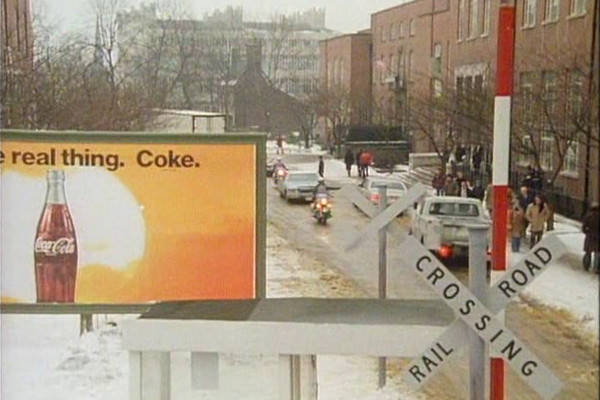
There's a turning point in this episode where for the first time the viewers get to eavesdrop on a private conversation between Jeff Ross and Karen in their CIA headquarters. Previously, viewers had only been privy to conversations as The Sandbaggers heard them, making their perspective our perspective. Although Jeff's a very likeable and engaging character, opening up the series to include him takes away his "outsider" status and removes some of the mystery surrounding him.
The story itself is a reasonably engaging affair involving a KGB agent who could one day be Prime Minister, and a US Senator who the Sandbaggers are guarding, his superiors not trusting of the CIA. Although some of the conspiracy theories presented in this one can be a little on-the-nose, as always with a Mackintosh script, the characterisation and pacing are compelling.
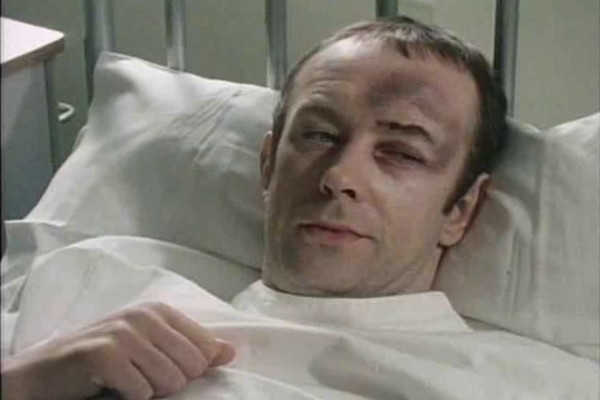
The last of three "fill in" scripts by other writers in Mackintosh's absence, this character-based effort by Gidley Wheeler is far more engrossing than his other entry in the series. Centring on Burnside's downfall, it can arguably feel a little contrived as karma repeatedly bites him during one horrible day: he can't even recreate a "you're never alone with a Strand" moment without teenage muggers beating him to the ground and leaving him with questionable make-up in a hospital ward. Despite this, and the feeling that the series was getting increasingly "safe" as it went on, this is another entertaining episode.
While filmed in 1979, the second season was heavily held back before broadcast, a factor not only made clear by the scheduling of the last two seasons so closely together (airing in 1980, only three months separated them) but also due to the multiple references in season two to a male Prime Minister who was expected to be celebrating his "victory". As Margaret Thatcher had held the position since May 1979, it was an odd inclusion that made the second series seem out of place in the real world in which it purported to occupy. The changing political landscape is finally referenced here by Jeff, who claims "Your new lady at No.10 isn't exactly making herself popular with Moscow."
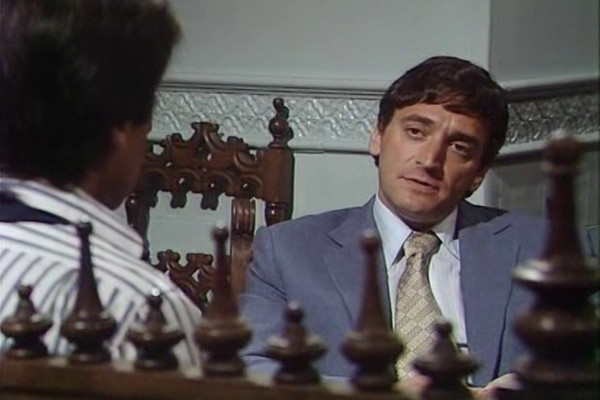
Multiple plot strands of varying quality make up this instalment. Primarily, it's the episode to introduce Laura Dickens as the new "bird" Sandbagger, though also in evidence is Stephen Greif in what appears to be faint make-up and a wig, putting on a "Maltese" accent. In terms of how bizarre this seems in 2016, then it's not as out there as Peter Miles as an Arab sheikh, but it's close.
The final plot thread sees Willie out to uncover terrorism in a job that Burnside's sent him on deliberately in the knowledge that Willie's a poor investigator and will draw attention to himself. Final scenes of a terrorist being held slowly at gunpoint while he aims a bazooka at a moving plane are perhaps a little far-fetched – it's hard to believe they wouldn't just shoot and not take the risk, for one thing – but it's an episode that still resonates today on some level.
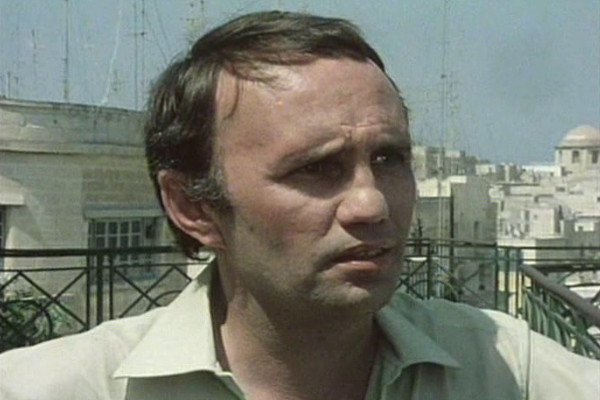
The series gets a rare trip abroad with some genuine overseas filming in Malta. Detailing the defection of the Director of Intelligence, what makes this one so compelling is the way in which the director decides to stop running and give in to the inevitable. It's a rare series that ends with two men calmly, yet sadly, discussing whether one will commit suicide in order to save the other the pain of assassinating him. It makes for gripping television as both struggle to hold back their emotions while the decision is made, two men who have spent their lives closing off feelings in favour of the job.
In terms of trivia, then one curious element of the programme is the prominence with which Coca-Cola appears. Sometimes it's acceptable, in that Jeff Ross is the nominal American lead, Burnside is stated to be teetotal, and shots like the one shown above for the 12th entry are there as a shorthand to suggest UK filming is really America. But with elements like a close-up on a can of Coke in the final episode, or the many times the logo is turned towards the camera, you'd almost believe it was product placement, were such a thing not out of the ordinary in the time in which it was made, as well as a bizarre choice for so British a series. Mention is made here because this is the episode where Jeff visits Burnside's home with a peace offering... 24 cans of Coke.
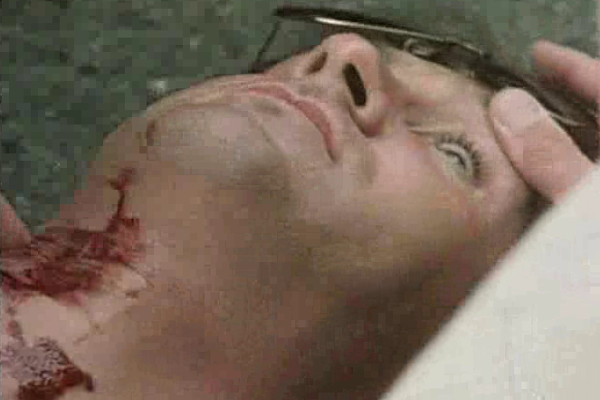
The final episode of the series, which sees Burnside's arrogance spin almost completely out of control as he sets about undermining world events. With Mackintosh's cynical view of the KGB, it transpires that Burnside's instincts are correct, and that the peace conference he wishes to ruin is being sabotaged by the other side regardless.
Although this article has tried to avoid spoilers as much as possible, the exciting last few minutes can't go without mention. After the explosive events of the first season, the lives of the Sandbaggers did become slightly more mundane, relatively speaking, and characters would see out the end credits without any mortal harm coming their way. Ray Lonnen has spoken of Ian Mackintosh's plans for a fourth season, alleging that Willie was to become the new, wheelchair-bound Director of Operations while Burnside got promoted. It's to the series' strength, perhaps, that it never got made: without a resolution to this episode's cliffhanger ending, viewers are left with the impression that a shot Willie might be dead, a suitably downbeat conclusion to a bleak programme.